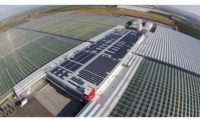The refrigerated food and beverage industry is increasingly moving toward high-pressure processing (HPP) as a means of developing new products. But, what some in the industry may not know is that HPP tolling gives all cold food processors the ability to produce HPP foods without having to install the equipment necessary to do so.
For example, Universal Pasteurization Co. (UPC), Lincoln, Neb., offers a complete lineup of HPP services such as kitting, sleeving, tempering, ink-jetting and full order picking, as well as HPP value-added services, including blast freezing, dry age curing, water and air tempering and a full complement of logistic services.
UPC is also home to four HPP tolling centers located in Lincoln, Neb.; Coppell, Texas; Villa Rica, Ga.; and Malvern, Pa.
“Geography plays a significant part in the planning process,” says Jeff Barnard, president. “We choose locations based on criteria like proximity to existing and potential customers, labor market, facility size, expandability and efficient transportation lanes. We are in the process of planning our fifth location for 2016.”
Because food safety is at the forefront of the cold food industry, advanced technologies help HPP processors accelerate new product developments while still achieving high levels of food safety.
“We see HPP technology and applications accelerating even faster going forward. Clean label and brand protection also play heavily in the decision process when exploring HPP,” adds Barnard. “HPP technology is being utilized in new applications every day. We are seeing products like premium juices, guacamole, salsas, dips, dressings, raw ground meats and ready-to-eat and ready-to-consume proteins. Most recently, we have HPPd some products that go back to the processing facility to be ‘reintroduced’ into the facility. This allows the processor to start with a cleaner and safer raw material.”
HPP Foods Group, Coppell, Texas, also offers an abundance of HPP services under the UPC umbrella such as re-packing, tempering, cold storage, frozen storage, order picking and toll processing
“By using an HPP toll processor, it converts fixed costs into variable costs while releasing capital for investment in other facets of a food manufacturer’s operation,” says Kelley Battles, president. “In addition, it allows a small food manufacturer to avoid large expenditures in the early stages of their business, so they can focus on their infrastructure and sales, which ultimately makes that small company more attractive to investors, since they are able to better allocate their capital into revenue-producing activities.”
Likewise, American Pasteurization Co., LLC (APC), Wauwatosa, Wis., provides a host of HPP services, including product development packaging and supply chain consulting, as well as many post-HPP assembly services such as shrink sleeve application, bar coding, overwrapping, banding, lidding, shrink wrapping, cartoning, palletizing and rapid thawing for beverage products out of its HPP tolling facilities in Milwaukee, Wis., and Sacramento, Calif.
“Using HPP tolling services rather than purchasing HPP equipment is typically advantageous for customers in a number of ways,” says Sarah Segel, customer services consultant. “HPP equipment is quite expensive to purchase initially, and customers often do not have enough volume to operate the machine at capacity. The machines are also labor intensive to operate, requiring a great deal of regular and often unexpected maintenance, which is costly and requires the machine to be down while it’s being serviced. This leaves manufacturers who do not have a second HPP machine unable to apply HPP to their perishable products. HPP tolling allows manufacturers who otherwise would never have access to the technology because both high initial and ongoing equipment costs apply HPP to their products on a per-pound basis, paying only for the services they use.”
Safe Pac Pasteurization, LLC provides HPP processing and packaging solutions for a wide variety of customers ranging from processed meats to bottle fresh juices out of its Philadelphia, Pa., tolling center.
“By providing HPP toll service, we can offer the advantage of HPP to smaller companies who can’t make the investment in HPP equipment,” says Guy Giordano, president and CEO. “We can also provide service to larger companies looking to develop a product or line of product that does not warrant the investment in HPP equipment.”
For its part, Lineage Logistics, an Irvine, Calif.-based warehousing and logistics company sponsored by Bay Grove Capital LLC, San Francisco, provides raw material and packaging storage, tempering, HPP tolling, extended channel supply chain management and value-added services like kitting, warehousing, transportation and freight consolidation programs. It also owns and operates two tolling centers—in Allentown, Pa., and Mira Loma, Calif.—and can process more than 100,000,000 pounds annually.
“Similar to food and beverage companies preferring third-party logistics solutions for warehousing and transportation, we see transferable value in our customers relying on the expertise of Lineage’s tolling solution,” says Tim Smith, executive vice president of sales and business development. “Our HPP tolling operations allow food and beverage companies to optimize their bottling and manufacturing footprint through an outsourced HPP solution.”
Overseas, Longfresh provides HPP tolling services out of its Sydney, Australia-based location.
“Geography is important in reducing transport expense and food miles, in saying that Australia is a large country, so HPP plays an important role in combating the tyranny of distance when it comes to chilled foods,” says David Byrne, managing director.
New technologies
Avure Technologies, Cincinnati, helps producers implement HPP from recipe development and process validation to installation, regulatory affairs and post-installation support.
“While Avure Technologies does not own any tolling centers, Avure equipment can be found in many tolling centers around the world,” says Lisa Pitzer, marketing director. “Geography is important for a tolling center because companies that want to HPP their product can save money in transportation costs if they are close in proximity to a toller.”
In fact, Avure developed a new upgradeable design for its HPP machines, enabling producers to buy the machine that best suits their current needs, but the machine can be upgraded to keep up as the company grows and volume expands. Dubbed the AV-X series, the upgradable machines boast a flexible design with a smaller footprint to suit individual production needs. The new design also reduces energy consumption by as much as 50%, and provides easier load outs for the producer.
For its part, True Fresh HPP has four 525-liter HPP systems from Hiperbaric, Miami, Fla., paired with what is said to be the most advanced production line peripherals, “so that line changeover times are dramatically reduced, thus allowing for savings in costs and providing our customers with quicker response times than have been the norm,” says Alan True, founder.
Additional services beyond HPP include product innovation, packaging design, date coding, case packing, logistics support and full cold chain process management. True Fresh maintains a tolling center in Los Angeles, with plans to expand with two new locations early this year.
“Future demand for HPP tolling services is on course to increase significantly due to consumer’s increasing preference for clean label products,” adds True. “The Food Safety Modernization Act guidelines will require manufacturers to improve the safety of all products, and HPP is the perfect application to lower the risk of recalls and provide safe products to the consumer.”
Triton HPP, Petaluma, Calif., also offers a complete range of HPP processing systems, including 50- to 525-liter capacity and vertical and horizontal systems in 1-30 liters for labs and pilot plants.
“For startups and younger food companies with less processing experience and leaner staffing, the decision to purchase an HPP system can be an existential one,” says Anthony Dal Porto, general manager. “My advice to such companies is to take the margin hit and work with an HPP toller until you have established your product in the marketplace and/or have built a deep enough bench on your operations team to handle bringing HPP in-house.”
Multivac, a Kansas City, Mo.-based supplier of HPP equipment to the food industry, and its partner Uhde HPT, Germany, introduced a full line of 55-, 160- and 350-liter and Tandem 700-liter HPP systems.
For example, Multivac’s HPP 350L is now in Texas Food Solutions’ Houston, Texas, toll processing plant. The Multivac HPP 350L is designed to optimize shelf life, enhance food safety and provide HPP services to third-party manufacturers from its sister company, Perfect Fit Meals, Houston, Texas.
“Special technology to handle modified atmosphere packaging and our ability to supply turnkey integrated primary packaging, inspection, HPP and secondary packaging lines sets us apart from the competition,” says Cem Yildirim, sales manager, strategic market development, HPP. “The future of HPP tolling is very bright. The relatively high cost of entry to HPP will continue to push innovative manufacturers to choose toll processors, especially for new products with unproven volumes.”
HPP units are not plug-and-play, says Byrne.
“You’d need a detailed understanding of the site requirements, the capital expense and the maintenance expenses before embarking on an HPP purchase,” he adds. “HPP will play a role in nurturing and growing small- to medium-size businesses or new food categories where traditional heat pasteurization is inappropriate.”







